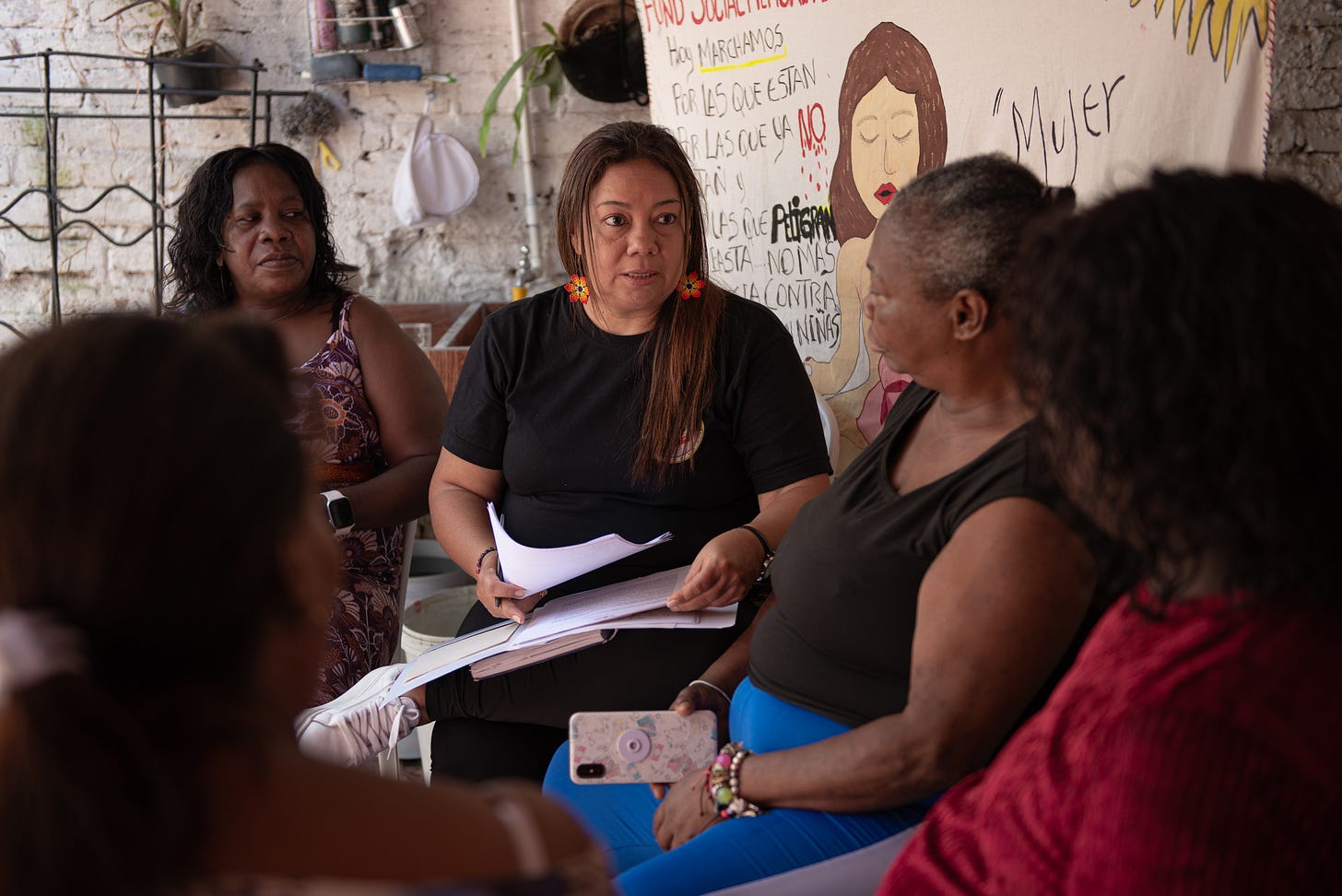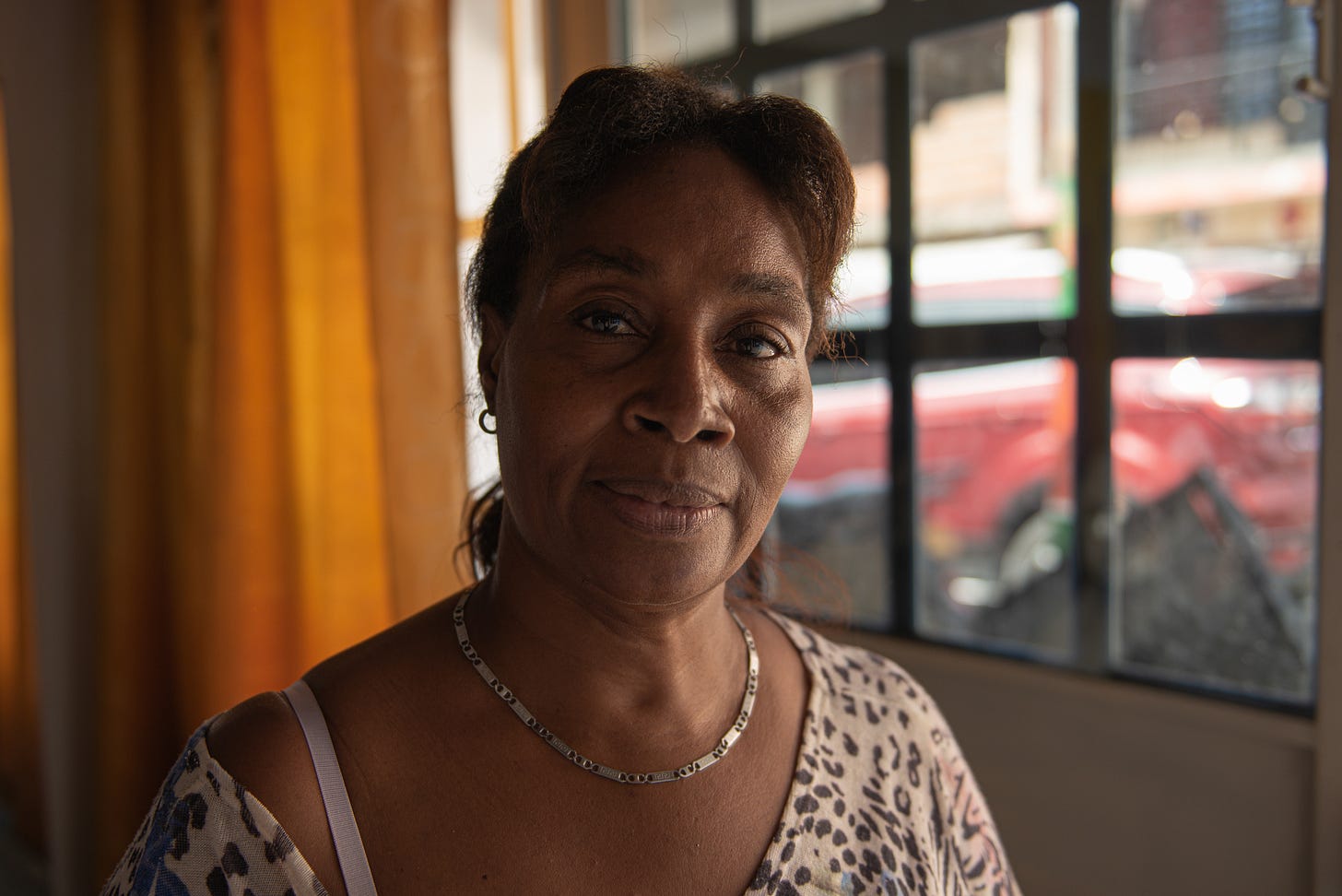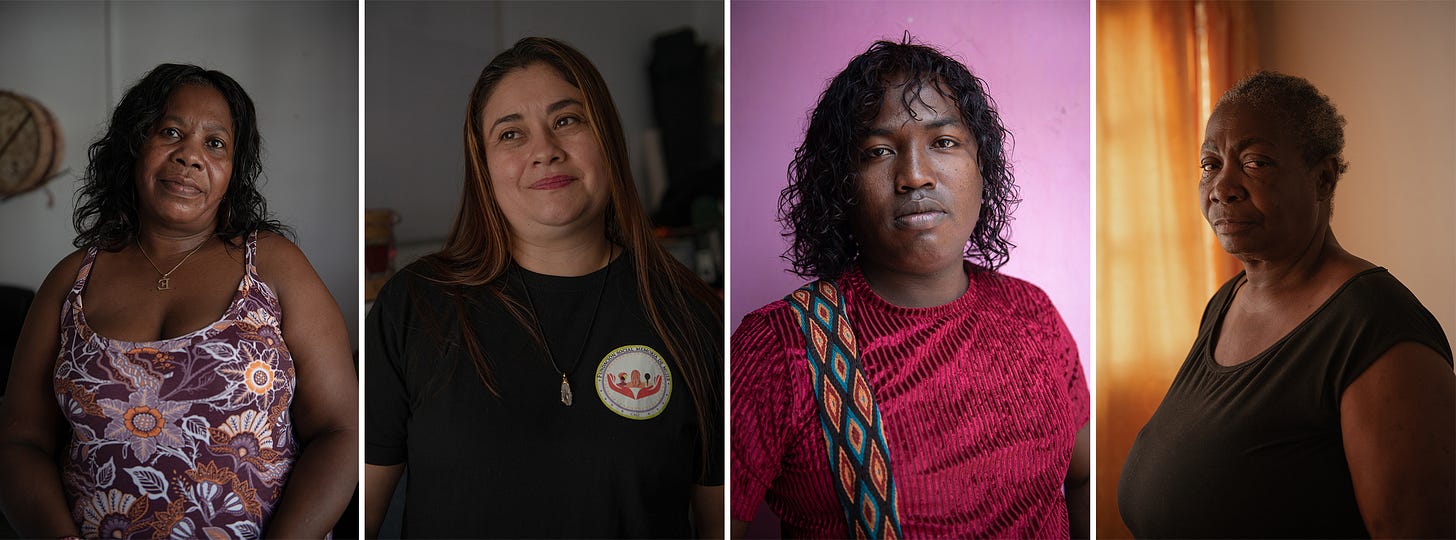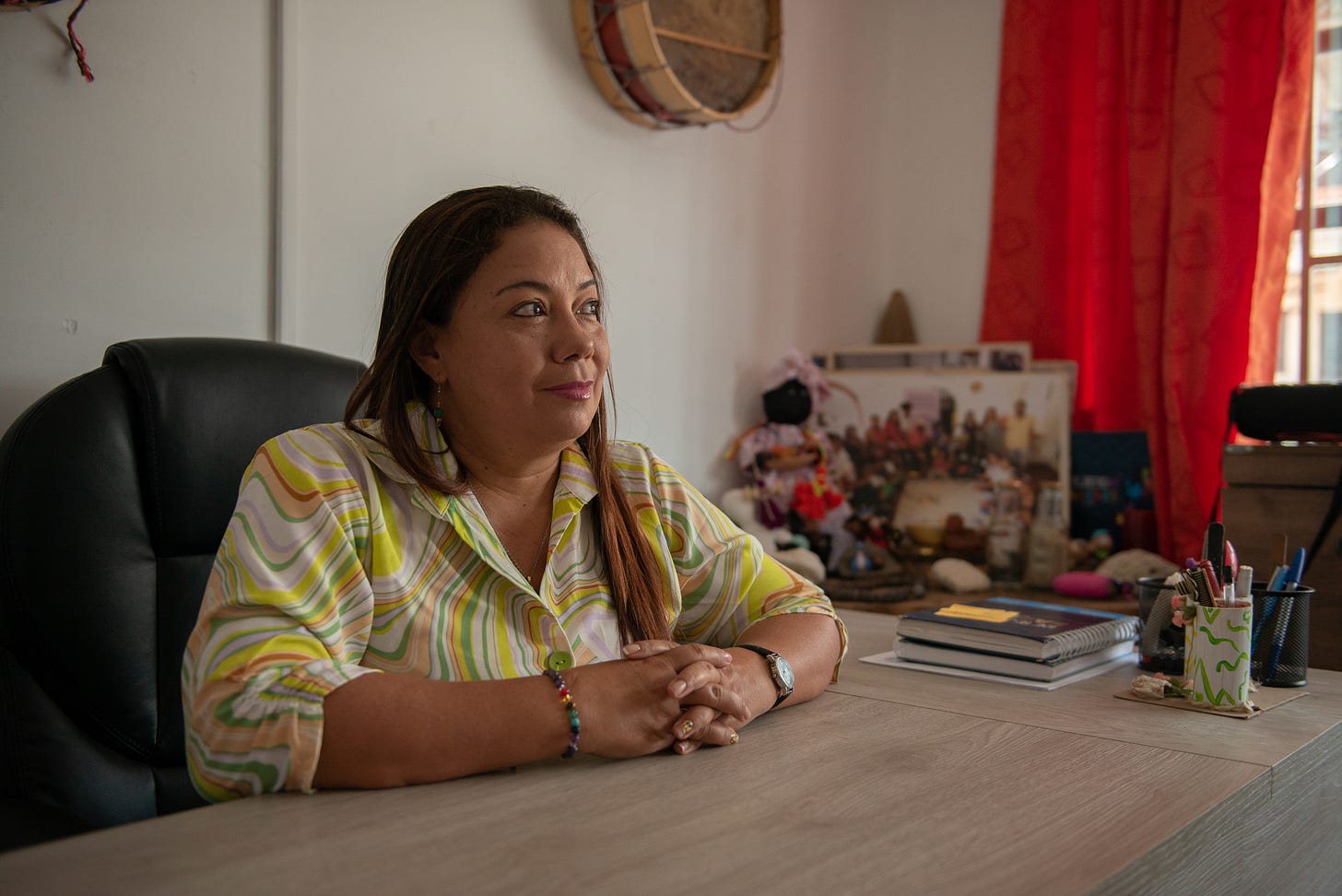In Post-Conflict Colombia, One Determined Survivor Fights to Reach Women No One Else Can
Her husband was among thousands of Colombians “disappeared” during the 52-year war, and she was forced to flee her home on foot. Now she helps others get the aid they desperately need.
Our team at Narratively is thrilled to partner with Bigger Than Our Borders, a collaborative of Canadian nonprofit organizations, to produce this special series spotlighting inspiring women and girls fighting for their rights around the globe
From the outside, the home of Nidia Landazury Sanclemente is unremarkable, a one-story house with white, concrete walls and a clay tile roof, similar to others lining the street. But in a poor neighborhood in the city of Cali, an enclave for survivors of Colombia’s 52-year armed conflict, her home has become a refuge. Throughout the week, war survivors seeking help arrive at her doorstep. One man, displaced by recent fighting between armed groups, is new to the city and needs aid. After fleeing from her home in a remote town, a woman asks Landazury to help her download a document that recognizes her as an armed conflict survivor. Another asks for an updated timeline for humanitarian aid promised by the government months ago, in this case, food vouchers used to buy groceries.
Some of those seeking help are members of a support network for survivors Landazury founded in her neighborhood. But many are strangers who’ve heard of Landazury’s reputation as a woman who will advocate on their behalf. “They come to me because they hear that I’m someone who helps survivors and stands up for them,” Landazury said over a recent Zoom call. The need is endless, but she wants to help them all. Not long ago, she was in their shoes, a survivor in need of guidance herself.
As a result of the Colombian armed conflict, there are millions of survivors just like Landazury. A 1964 uprising of the Revolutionary Armed Forces of Colombia (FARC), a group of Marxist farmers demanding the equal distribution of land and political power from the government, evolved into an all-out war. This was exacerbated by the rise of drug trafficking and counterinsurgent armies in the following years. When a peace deal finally ended the FARC’s armed rebellion in 2016, nearly 8 million people had been made internal refugees and more than 450,000 had been killed.
Still, the violence continues. In the years since the peace deal, smaller armed groups and rearmed FARC fighters have spread fresh terror and targeted new victims. Youth are recruited and activists killed in regions where state services are absent. While the peace deal created provisions to address the root causes of the war, such as rural investment and land reform, they went largely unenforced by former President Ivan Duque, a critic of the deal who served from 2018 to 2022. With the war raging on, the number of survivors needing support grows every day.

Like thousands of other displaced Colombians now residing in Cali, the survivors reaching out to Landazury for help come from war-weary towns strung along the Pacific Coast, where armed groups hide in the jungles. Forced to leave behind their land and possessions, these displaced people make new homes in Cali’s poorest neighborhoods, braving a host of new troubles as they restart their lives.
In 2003, Landazury, her husband and their son lived in a tiny village tucked away in the remote jungles of the northwestern Chocó Province. Illicit gold mining and the logging industry provided work for the pair, with Landazury and her husband camping out for days in the jungle and sending canoes filled with logs and gold downriver to be transported to buyers in Medellín and Bogotá.
There they lived under the rule of the United Self-Defense Forces, a far-right paramilitary group that eventually demobilized in 2006 after signing a pact with the government a few years earlier. But new paramilitary factions followed, with one such group imposing a “tax” on local businesses that Landazury’s husband frequently objected to. She believes his defiance cost him his life.
On March 29, 2009, Landazury’s husband left his house for work at 7 a.m. and never returned. In the village, there were no police to call. The military colluded with the armed groups, and when Landazury tried to find answers on her own, her neighbors and co-workers warned her against asking too many questions. If she made too much noise, she would be the next one to disappear. Fearing for their lives, Landazury and her teenage son slipped out of the village, without warning anyone. They arrived in Cali two days later, carrying only the clothes on their backs.
As Landazury started her life again from scratch, she set out to get justice for her husband, but found out quickly how difficult receiving any type of support from the government would be. At the door of the Public Ministry’s office, an official explained that she would need her husband’s death certificate to report his disappearance, even if there was no way for her to obtain one. Without the document, Landazury wouldn’t even be allowed to enter the building.
It took five more visits to the Public Ministry’s office over the next two years before Landazury could file a criminal report, register as a survivor of the armed conflict and later, receive monetary aid for food and shelter, and a compensation payment (she did not want to disclose the amount). While Landazury was able to secure some reparations for herself, sparring with the Public Ministry’s office for two years eroded her trust in the state further. “There are institutions that are created to benefit victims, but what you see is that they violate their rights,” Landazury says.
Nonprofits had sprung across the country to support survivors, but were also spread thin and rarely made it to Landazury’s community. So she decided she would bus to workshops organized by nonprofits and share her notes with her neighbors who were armed conflict survivors, too.

In 2015, she went a step further and held a workshop for the first time, hosting a group of friends in her living room in the Manuela Beltrán neighborhood and teaching them everything she had learned at a workshop about gender-based violence. This was especially relevant, as survivors of the armed conflict, particularly women who are displaced and live in precarious conditions, are more susceptible to domestic violence. For Landazury, the workshop had cast a new light on previous experiences of abuse, both before and after she was displaced.
“As a survivor and a woman who has been abused, I did what I could for our community to learn about gender-based violence because they don’t teach us these kinds of things even if it affects us,” Landazury says. “It was important to me to bring this back to our neighborhood because we live in vulnerable conditions, without much education or ways to defend our rights.”
News of the informal classes spread, and by 2017, her workshops regularly hosted 30 students. From this, the nonprofit Fundación Social Memoria de Mujer (Women’s Social Memory Foundation) was born.
Now, every month neighbors file into Landazury’s living room or a nearby office to attend classes. They range from sessions on how to apply for humanitarian aid or report crimes endured during the conflict, to art lessons on processing psychological war traumas.
“I try to speak up for them, to help out, to guide them,” Landazury says.
At one such class, Landazury instructs her students to picture the homes they had been stripped of. The prompt sends their minds to obscure places, far from the chaos and noise in Manuela Beltrán. The women lift their brushes, dipped in pinks, blues and oranges, and for the next four hours, recreate images of their past lives onto the blank canvases before them. A crimson sun setting over the Pacific Ocean, a tangle of mangrove trees harboring crabs and fish, tall cascades with water as blue as the sky.

In many ways, activists like Landazury fill in the void left by state agencies that struggle to meet the needs of millions of survivors. In 2011, Colombian legislators passed a law promising to pay compensation to more than 3 million survivors and to restore abandoned lands by 2021, among other reparative measures. The Law of Victims and Land Restitution, hailed as one of the most progressive laws of its kind in the world, also created the first official census of survivors in the country. The count now registers more than 9.5 million survivors, out of which about 7.5 million are eligible for aid.
But in 2021, when the law was set to expire, only 1.1 million had received compensation. Although the law was extended to last through 2031, critics say its faults remain unchanged. The agency created to pay reparations, the Victims Unit, needs at least $65 billion, according to the agency head. It’s absent in many poor rural and urban areas where it is needed most, and at its current pace it’s expected to finish payments within 55 years or more.
“People who should go to the government for a response come to Nidia first,” says Estefania Vargas, a legal coordinator at the Colombian chapter of Lawyers Without Borders Canada (LWBC), a Canadian nonprofit that supports survivors’ groups in Colombia like Landazury’s.
Every year, Landazury teaches classes and provides humanitarian aid to an estimated 2,500 people. One of the reasons Landazury is able to press on with her classes is due to the financial support provided by organizations like LWBC, which pays for her students’ transportation, supplies and meals. During a five-year program that started in 2017 and was funded by the Canadian government through Global Affairs Canada, LWBC also trained survivors on the 2016 peace deal and the provisions created to advance survivors’ rights. These include a peace court created to try crimes committed during the war and congressional seats allocated to survivors. As part of the program, Landazury now incorporates these lessons into her workshops, bringing vital information into communities where state agencies have less of a presence.
“The women have achieved a high level of empowerment,” Stelsie Angers, the director of LWBC’s Colombian office, says. “But support is important so that they can continue along this path.” LWBC has presented various projects on women’s rights and transitional justice, and has high hopes of continuing its work, teaching a new cohort of leaders the skills they need to sustain their communities.
Similarly, Landazury would like to host a wider range of classes in the future. She imagines workshops that teach women who are conflict survivors how to start their own businesses and become financially independent. It’s part of a larger idea for the women who have attended her classes for years now to fully stand on their own.
“I don’t have a higher education, but with what I’m constantly learning, I’m able to guide people,” Landazury says. “I want these women to continue learning and to be independent, too.”
In this series, produced in partnership with Bigger Than Our Borders, a collaborative of Canadian nonprofit organizations, we’re spotlighting stories that demonstrate the impact of Canada’s feminist foreign policy. Learn more about initiatives supporting women, girls and gender-diverse individuals around the world at biggerthanourborders.ca.
Christina Noriega is a freelance journalist based in Bogotá, Colombia, where she reports on human rights, the environment and migration. She has reported for international publications such as Al Jazeera, The Guardian, Foreign Policy and El País.
Carolina Navas graduated from the School of Social Communication at the Universidad del Valle in Colombia, and has taken part in numerous workshops in Buenos Aires and Bogota, related to photography and documentaries. Throughout her career she has worked as a documentary series director, photographer and cinematographer.
Jesse Sposato is Narratively’s Deputy Editor.




